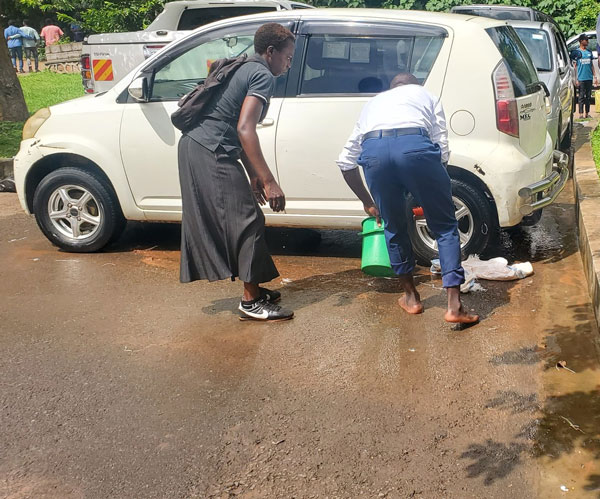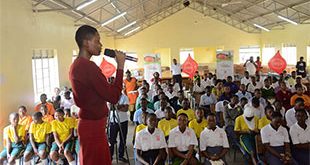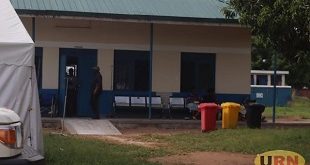
Kampala, Uganda | THE INDEPENDENT | Student leaders at Makerere University led by the Guild President Robert Maseruka have started a campaign to solicit funds and support underprivileged students clear their tuition.
Last month, the students launched the campaign dubbed “Save a Makererean” aimed at raising sh1 billion .
On Friday, the students organized a car wash event at Makerere University’s Main Mosque, targeting Muslim alumni, lecturers, students, and visitors as part of their year-long fundraising initiative.
Each car was washed at 30,000 shillings and the students collected more than 350,000 shillings.
The initiative includes continuing the car wash campaign at St. Francis Chapel and organizing a fundraising breakfast and a run. The student leaders also plan to reach out to civil society, non-governmental organizations, Members of Parliament, and influential community members for support.
Approximately 1,000 students drop out of Makerere University every academic year due to challenges related to tuition fees. Maseruka highlighted that nearly 3,000 students were unable to sit for their end-of-semester exams due to unpaid tuition fees.
Tuition fees at Makerere University vary depending on the academic program. The fees range from sh900,000 to sh2.5 million with the exclusion of the functional fees, which amount to over sh600,000.
In April, while appearing before the Education Committee of Parliament, University Vice-Chancellor Professor Barnabas Nawangwe also confirmed that the university was consistently losing a minimum of 1,000 students each academic year due to their inability to meet tuition expenses.
Professor Buyinza Mukadasi, the Makerere University Academic Registrar, said that in a bid to provide an enabling environment for students who are unable to meet their financial obligations, the management has already approved an employment students work scheme” in which, students would engage in community service within the university, and their earnings would be used to cover their fees.
According to the Makerere University tuition policy, all privately sponsored students should pay at least 60% of their tuition at the beginning of every semester and full functional fees at the beginning of the first semester.
Professor Mukadasi explained that students who fail to pay 100% of their tuition fees by the exam period can appeal to the Vice-chancellor for special permission to sit exams, an avenue several students have used before. However, he emphasized that such permission is not an automatic entitlement.
For a long time, several privately sponsored students in several higher institutions of learning have been facing tuition challenges at the beginning of the semester, mid-way, or at the end of the semester.
Many of these resolve to fundraising within particular classes where students volunteer to solicit money and save their colleagues while others apply for financial aid, which oftentimes is unsuccessful.
Last year, Deputy Speaker of Parliament, Thomas Tayebwa observed that the current government sponsorship program favors the affluent over the disadvantaged.
He contended that the current system was disproportionately benefiting students from well-to-do families who attended expensive schools like Mt St Mary’s College Namagunga, St Mary’s College Kisubi, and St Mary’s Kitende and attained government sponsorship cut-off points.
***
URN
 The Independent Uganda: You get the Truth we Pay the Price
The Independent Uganda: You get the Truth we Pay the Price




We shall always respond
Deputy speaker
The problem lies else where
Because they study from well facilitated schools
They qualify for subjects that are considered for government
spondorship
The same candidates performed well in both PLE and UCE
In other words they had a potential to make it
It was complemented by studying in the conducive environment
This potential to make it in the academic field is wide spread
The gap lies in failure to access a conducive environment
So under normal circumstances, this conducive environment falls into what is called ” essential service”
If this essential service was accessible nationwide, then the Deputy speaker would have a different story
In the first 16 years after Independence;
Parents who were predominantly peasants obtained school fees from their sweat, selling coffee and cotton at known prices. Even when not paid in time, they were sure of a reliable source of money pay fees
A child from a poor family, who performed well at primary level, was very likely to be assosted by the home District, to get to a good school of his/ her choice
Now Sir
We have seen ( this week that teachers of primary schools are resigning because of miserable conditions at the work place)
The teachers by then, of grade 2 taught us in primary school
We were taught by teachers who were diploma holders and some graduates in secondary school
We sat and passed examinations set by the East Africam Examination Board
Because of the well entrenched essential service the students admitted to the University came from all areas of the country
That was their first time to report to Kampala but with very good grades
Coming from an ordinary home does not stop one from studying in the university, other wise individuals who carried cow dung to school to maintain school floors would not have contributed to national policies
As a beneficially of an all embracing essential service: a girl child who attended a village school and completed the University in a Scientific field. I beg you to get an alternative argument for this problem.